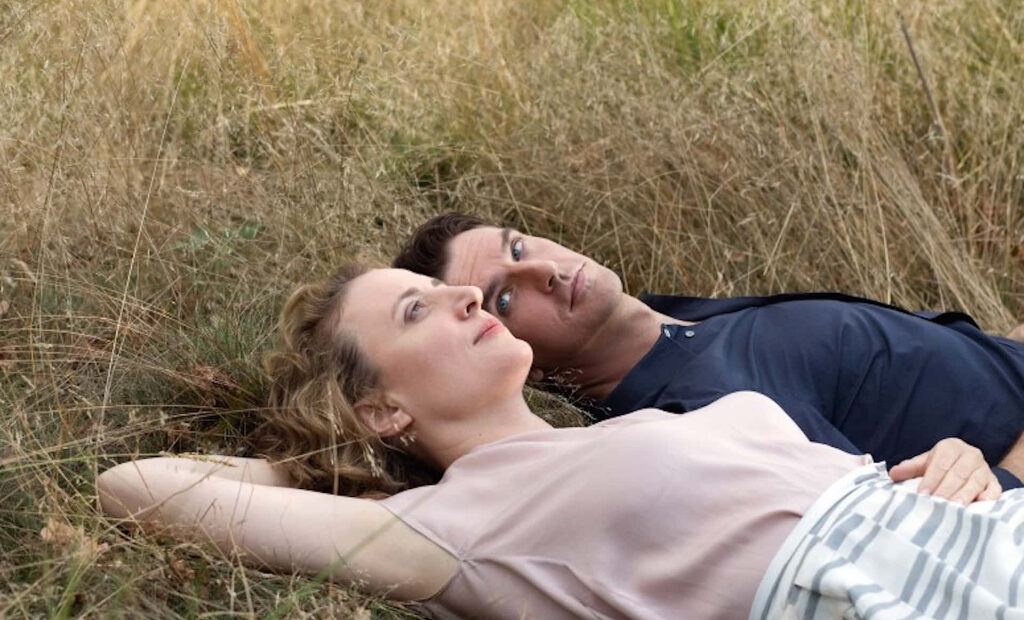I’m Your Man (Ich bin dein Mensch): An interview with stars Dan Stevens and Maren Eggert

Premiering in competition (and in quarantine) at the 2021 Berlinale, I’m Your Man (Ich bin dein Mensch) sees Dan Stevens playing Tom, a robot designed to be the perfect partner of whomever he’s paired with. Alma (Maren Eggert) reluctantly agrees to test Tom in exchange for funding for her own research project. We had a virtual chat with Dan and Maren about the film and whether companion robots are inevitable.
Do you think that the creation of a humanoid robot like Tom can truly create the ideal partner? Does it seem absurd at all that a machine could meet all our needs?
Dan Stevens: Is it absurd? I mean, that really is one of the big questions of the film, I think. It really invites you, as the viewer, to sort of think about – well, would I? Could I? Could I live with this, and what would mine look like? I think those are, you know, very human questions. So, I don’t know if I have an answer specifically, but I love that the film has provoked that question so frequently.
Although the technology depicted in the film doesn’t exist yet, is it a metaphor for other machines we have relationships with, such as our phones?
Maren Eggert: I think you’re completely right. Algorithms are in our everyday life, and I see grown up people who start to cry when they have to give their mobile away for a while. So it’s already there. We have to think about what to do about it, and how we care about it.
With much of the world in quarantine, many people have perhaps been asking if the person they share their lives with are in fact the right person. Might people be more accepting of a robot partner if only because it can be designed to mirror us as individuals?
DS: I think, certainly when I read this script last spring, a lot of these questions about where humanity was at, let alone the person in our apartment, but all of us were – how did we get to this point? Where are we going? It was a big question year, and I think a lot of those questions were just somehow very, very neatly laced into the bedrock of this project. It’s one of the things that made me feel so delightful about it really.
ME: Maybe looking through Alma’s eyes with what she’s experienced, I can understand that she was quite scared by being mirrored like that – by being mirrored by a machine who had all this data about her. It’s a machine that knows something about her, and for me, it’s scary in the first place, and then interesting or funny, but in the first place still scary, and awkward.
Perhaps it’s just a personal opinion, but the two of you seemed to be having a great deal of fun with the material, particularly with the playful power dynamic between your characters. Was this the case?
DS: I hope so. I try to take a playful approach to almost everything I do. If the fun is coming across, then we’ve done our job well. I keep having to apologise to Maren because the usual dynamic of a scene was just not there for her, and also for Tom (his character). So the usual interplay was interrupted somehow, so we had to find our own way of finding those rhythms and finding our dynamic, even though they’re in quite different places.
ME: We had to find our own way to communicate as actors, because, I mean Dan – you did it so well, so at points I thought, where is he now, and who is this robot I have here? So, it wasn’t easy at times, but we had a lot of fun, you’re right. And also with Maria (Schrader, the film’s director), we all really enjoyed the shoot.
Refreshingly for a film, the robot isn’t depicted as sinister or destructive. There’s almost a screwball quality to Tom the robot.
DS: We looked at a lot of screwball comedies – Philadelphia Story was one – Cary Grant, Jimmy Stewart and Katherine Hepburn – and I think there’s a lot of Katherine Hepburn in Alma as well, with that sort of like for like and back and forth – it’s kind of what you want to see in these films. I think about the styling of Tom as well. I didn’t come with too many preconceptions about what I thought Tom should look like, and I really wanted to leave that up to Maria and the designers – to kind of almost hand myself over to the process. I didn’t want to impose my masculine version of you know, Dan’s idea of a robot. I wanted this very much to be Maria’s conception. So the idea of dying the hair a little dark, so it had a slightly artificial quality to the colour and the cut. It was just a little bit off, I personally wouldn’t normally dye my hair that colour, but that was a conscious choice – to go a little Cary Grant with it.
Maren, your character is presented as being extremely closed off to other people. How do you approach playing such a character in a way that makes her accessible for an audience?
ME: That’s a good question, because we talked about that a lot. That was about the first thing that Maria said to me – that we had to make Alma understandable for those watching the movie, to be able to follow her through the whole story. It wasn’t quite so easy, because she was a bit rude in the beginning, and it was a task to still make her open enough, maybe. It had something to do with self… What is the word? Self-irony? I didn’t like myself very much in the scenes where I pushed someone away, or in the scene where I was drunk. I kind of thought, yeah, well, no one will like her after that, but this is what her story is all about.
DS: It also becomes a challenge for Tom, to unlock that part of Alma, because she is that way. And he goes in there with this sort of mission, this program, of how do I get through to this cynical heart? And I think you can see that in some of the scenes, and it’s like if I do this, I win points – I unlock another level.
Was this your first project during the pandemic and did that create a sense of unease, of wondering if it’s worth it?
DS: For me it was the first thing shot during the pandemic, and I think filmmaking always seems a little bit mad, and there’s always inevitably one scene that you’re trying to shoot, and you think, what are we doing? And that happened a few times on this, because all of us were concerned about so many things: we both have families, and there were all those concerns coming to and from work. It’s a strange time, but if I was going to work during this time, I wanted it to be something that asks such wonderful questions. It was such a lovely piece.
ME: Dan was talking about children and having families, and maybe this goes too far, but when we discussed our hygiene terms for how we were going to do this, and the question came up: Maren, would you move to a hotel to quarantine? That was the point where I asked, was it worth it – to do a movie and go away from your family? Maybe if I had to do it, I would have, but that’s the price you pay. During the shoot, Dan was about the only person besides my family who I could go closer to than 1.5 metres! That’s a really interesting thing, and we were quite isolated. But still, how lucky we were to be able to do this.
Oliver Johnston
I’m Your Man (Ich bin dein Mensch) does not have a UK release date yet.
Read our review of I’m Your Man (Ich bin dein Mensch) here.
Read more reviews from our Berlin Film Festival 2021 coverage here.
For further information about the event visit the Berlin Film Festival website here.
Watch a clip from I’m Your Man (Ich bin dein Mensch) here:


























Facebook
Twitter
Instagram
YouTube
RSS